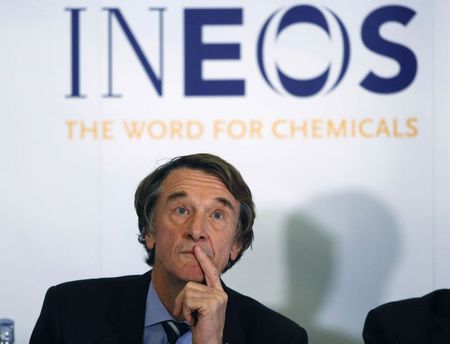LONDON (Reuters) - Swiss chemicals group Ineos announced on Thursday plans to invest $1 billion (0.63 billion pounds) in shale gas exploration in Britain, hoping to emulate the U.S. shale boom in one of few European countries to endorse controversial fracking technology.
The $1 billion investment, which is subject to Ineos winning UK shale gas licenses currently being decided, would mainly cover exploration costs, the company's chairman, Jim Ratcliffe, said.
The planned investment would go ahead within five to six years and there would be large investment after that, he said.
"I want Ineos to be the biggest player in the UK shale gas industry. I believe shale gas could revolutionise UK manufacturing and I know Ineos has the resources to make it happen," Ratcliffe told a press conference in London.
Britain's Department for Energy and Climate Change (DECC) is currently assessing bids for shale gas licences and Ratcliffe said he expected the licences to be awarded early next year.
Gary Haywood, chief executive of Ineos Upstream, said hundreds of wells would be drilled if Ineos gets the go ahead. Less than $10 million had been invested so far, he said.
Ineos has previously said that it would share 6 percent of shale gas revenues with communities where it is found, with 4 percent going to home and land owners and 2 percent going to the wider local community.
It said there would be a benefit of 2.5 billion pounds ($3.93 billion) for local communities should Ineos win all the bids it had submitted.
The vast majority of the onshore licences Ineos has bid for are in Scotland and northern England, it said.
"Substantial further investment would follow if the company moved into development and production," it added in a statement.
Ineos already owns two shale licences in Scotland covering more than 120,000 acres.
Britain is in the early stages of extracting shale gas resources to lower its dependence on energy imports, but exploration to see whether the resources are commercially viable has been slow in the face of local opposition to hydraulic fracturing, or fracking.
The burgeoning industry faces fierce opposition from environmental activists. Critics say the fracking extraction process - injecting chemicals, sand and water into rocks at high pressure - can pollute water supplies and trigger small earthquakes.
The fracking process is banned in France and Germany plans only to allow it in exceptional cases.
Ineos say it has a strong safety record and points to the United States, where extensive fracking has driven down energy prices.
The British Geological Survey estimates Britain could have shale gas reserves of 49.4-134.6 trillion cubic feet, but it is unclear how much of this could be recovered.

(Reporting by Ron Bousso and Simon Falush; Editing by Jason Neely/Pravin Char/Susan Fenton)
_800x533_L_1412520412.jpg)